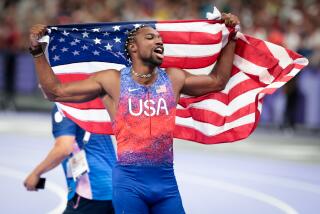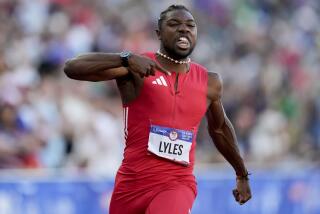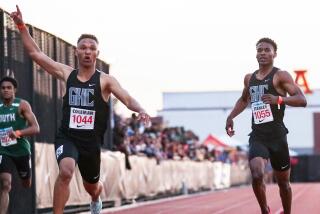CALL OF GHANA : But Reks Brobby, Olympic Sprinter, Has Chosen Instead to Stay in Irvine
- Share via
Thousands of miles away from his African homeland, sprinter Reks Brobby warmed up on the UC Irvine track last week and explained why he has chosen to live and work in the surrounding master-planned community instead of returning to his native tribe in Ghana.
“The weather and the facilities here are fantastic,” Brobby, 23, said. “What more could you ask for?”
But Brobby, a British-born Ghanian who settled in Irvine after he represented Ghana in the 1984 Olympic Games at Los Angeles, is not entirely settled in his decision to remain.
Though he has made innumerable friends--world-class hurdler Edwin Moses is his training partner and closest confidant--and enjoys his work as a manager of an Irvine gift shop, Brobby is sometimes troubled by the knowledge that he is wanted back home.
Though most of his immediate family--his mother, four sisters and three brothers--live in England or the United States, Brobby still calls Ghana home. His father, Brobby’s main inspiration, is buried there after he succumbed to lung cancer in 1983.
His 92-year-old grandfather, Nana Baafour Osei Akoto, is chief of the Ashanti tribe, the largest of more than 50 tribes in Ghana. “Nana,” or sir, as he is called, wants Brobby--the youngest son--to return to Ghana to learn the ways of his ancestors.
Brobby wants to remain in the United States, where he can live and, he believes, more properly train for upcoming competitions--namely, the African Championships, beginning Aug. 23 at Algiers, Algeria, and the Olympic Games at Seoul.
“My main goal is to be the fastest man in Africa,” said Brobby, whose personal best in the 100 meters is 10.27 seconds. “And then the Olympics. I want to be the fastest man in the world.”
Though he exudes great confidence in his abilities--according to Track & Field News, a 10.27 clocking may not advance out of the first round at Seoul--Brobby says that at times he is disheartened by his grandfather’s wishes for his return.
“He’s not the typical grandfather who would go crazy for his grandson to be in the Olympics,” Brobby said. “He was very upset, very disappointed (when he wouldn’t return to Ghana). He thinks I’m out here just fooling around. One of his people called once and said I’ve played around enough, to come home and get serious. . . . He just doesn’t understand.”
Nana, who is just 5-feet tall, has 20 wives and some 60 children, though Brobby said, “there’s probably more that that, but no one can really be sure.”
Nana is wise man to the Ashantis’ more than 2 million people. He lives in the Manhyia Palace at Kumasi, the capital of the Ashanti region, and he serves as chief linguist between the Twi-speaking Ashanti and the other Ghanian tribes.
“He sits on a throne and gives advice to people,” Brobby said. “Everything he said is a parable. People come to him from all around to solve their problems. He is the wisest man in all of Ghana.”
Brobby, who was born in London but moved to Ghana when he was 7, is most uncomfortable with one aspect of the Ashanti culture--its belief in and practice of black magic.
“I’ve seen things happen and it scares me to death,” he said. “Sometimes I want to go back, but I don’t want to get (mixed up) in that side of it. I’d just rather stay away.”
In doing so, Brobby has become well adapted to life in the United States.
Has this Ghanian been Americanized?
“I wouldn’t say Americanized,” Brobby said. “I would say Reks-ized. “
Indeed, Brobby, who has a charming wit and an infectious laugh, has a style all his own.
His clothing, once of brightly colored kente cloth, the traditional dress of the Ashanti, has been replaced with L.A. chic: super-baggy trousers, silk blazers, double-wrap belts. His hair is cut in an aerodynamic V.
“I’m a fashion thingy-a-bob,” he said, using his favorite all-encompassing word. “It’s my weakness.”
Brobby’s diet, once filled with Ashanti staples including fufu , a sticky mash of sweet potatoes, is more along American lines.
His favorite food?
Ketchup.
“Oh, I love ketchup,” Brobby said. “That’s my other weakness. I like it on everything. I’ll put it on Chinese food and Mexican food and steak. . . . I think it enhances the flavor, really.”
Once, on a dinner date, Brobby ordered fettuccine Alfredo, with a bottle of ketchup. Brobby, concerned over his date’s reaction, was surprised to find that she thought his request delightful.
Said Brobby: “She asked me, ‘What kind do you prefer?’ I said, ‘Oh, Heinz. It’s my favorite.’ It turned out her great-grandfather was Mr. (H.J.) Heinz, (the company founder). The next week, she sent me a case of ketchup and a ketchup telephone and a ketchup clock.”
The clock, which wakes Brobby up each morning with a song--”Get up! Get up! Or it’s ketchup all day!”--sits at the edge of his bed just underneath two newspaper clippings that hang on the wall above his head.
The first is of Moses, winning the 400-meter intermediate hurdles at the U.S. Olympic trials July 17. The second is of Canada’s Ben Johnson, blazing to a world-record 9.83 in the 100 meters at the World Championships in Rome last August.
“That is what I look at every night before I fall asleep,” Brobby said. “And it is the first thing I see when I wake up.”
Though Brobby didn’t start training seriously until 1982, his times were fast enough to catch the attention of the Ghanian Sports Council. In 1984, he was named flag-bearer for his nation’s Olympic team--14 athletes strong.
When he told his family that he was to represent Ghana in the Olympics, they didn’t believe him. He left for Los Angeles without so much as a “good luck” or “go get ‘em.”
“I really missed my father then,” he said. “He was the only one who really believed I could go to the Olympics.”
It wasn’t until his mother and sister saw Brobby on television, bearing the red, gold and green flag of Ghana in the opening ceremonies, that they believed. “Then there was about six (telephone messages) waiting for me when I got back to the Olympic Village that night, and they came out the next day.” Brobby said.
Duke Brobby, 47, explained why the family may have downplayed his brother’s original interest in track.
“When you’re from the Third World, you’ve been brought up to think there’s only one channel, one way to make something of yourself. That is through education. If you’re trying to do something outside, like athletics . . . they think it’s OK, for a short period. But not like here, where sports is (so popular) and you see football people and baseball people making so much money.
“But I support him 100%,” Duke Brobby added. “I wouldn’t have it any other way. I know with a little help, I think he can beat even Carl Lewis. At the rate he’s going right now, I wouldn’t be surprised if he passes those big guys soon.”
A big brother’s encouragement can help only so much, of course. The difference between Brobby (10.27) and Lewis (9.93)--as far as legal bests go--is .34 seconds, a long yawn in a 100-meter race.
In 1984, Brobby got as far as the semifinals in the 100 meters. Running in the lane right next to Lewis, Brobby finished fifth in his heat, and only the top four advanced to the final.
Danny Williams, Brobby’s coach, believes Brobby is ready for a big improvement.
“I think he’ll make a hit at the Games,” Williams said. “He made it to the semis as a mere lamb. Now he’s a tiger. It’s been a 360-degree turnaround.”
Whichever way he turns, Brobby--whose African name is Nana Kwabena Agyeman (Savior of Nations)--said he’ll never forget that Ghana is his homeland.
“Some Ghanians try so hard to be Americanized,” he said. “They ignore their roots. I think that’s (wrong). . . .
“I’m not saying I’ll never go back. But right now, I’m just not sure which way to go. I just know I want to be the fastest man in the world.”
More to Read
Go beyond the scoreboard
Get the latest on L.A.'s teams in the daily Sports Report newsletter.
You may occasionally receive promotional content from the Los Angeles Times.






